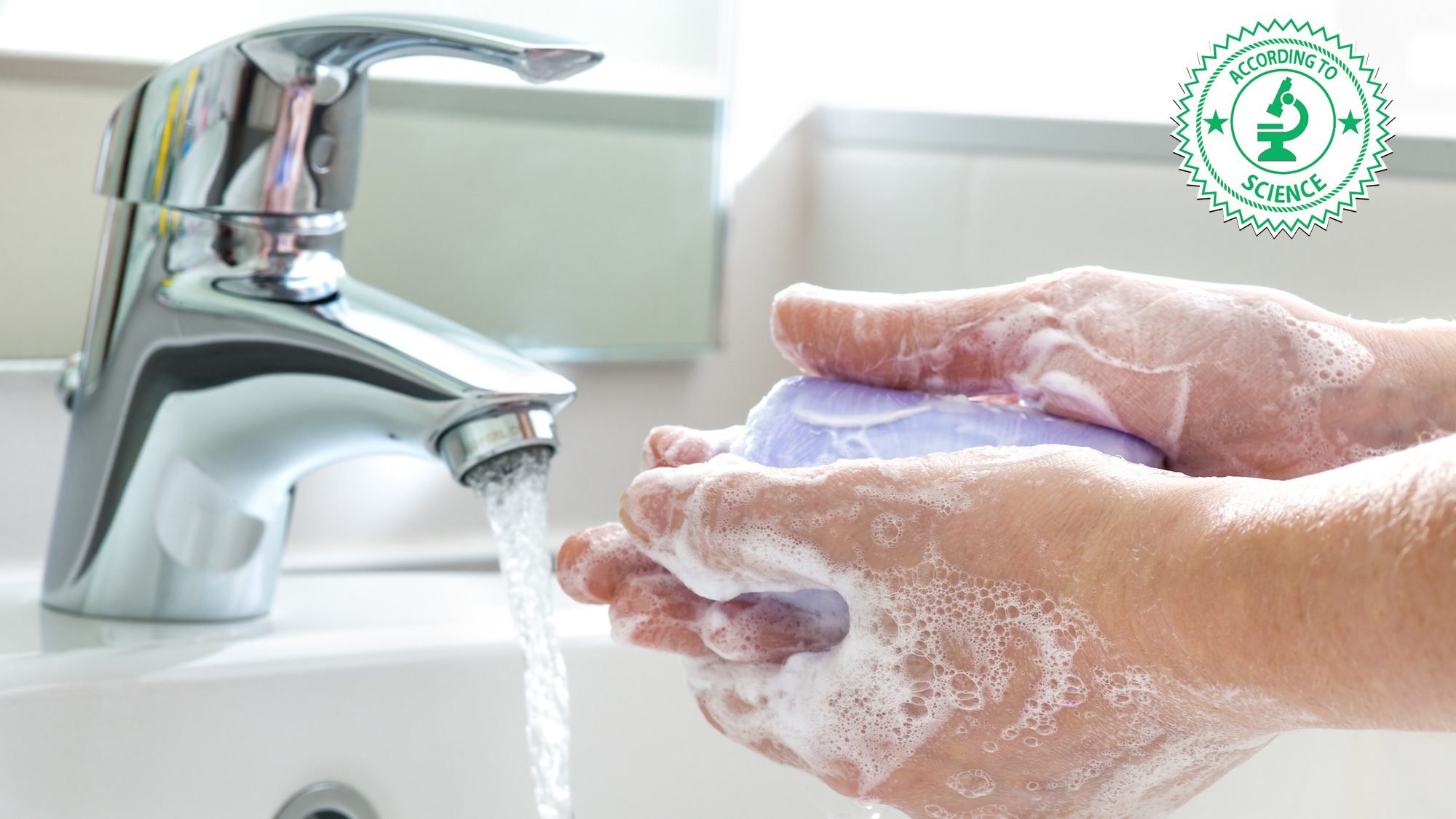
AlexRaths/Getty Images
You’re in a public bathroom when you see it: A bar of soap next to the sink, just to the right of the faucet, still sudsy from the last person to use it. Yuck.
Is it really possible to get clean from rubbing your hands with a communal bar of soap? Wouldn’t it be more sanitary to use liquid soap? And sure, public bathrooms are gross by nature, but is your bar of soap at home really any better?
And what better time to answer these questions than during a pandemic, when we’re all (hopefully) being extra diligent about washing our hands. To get you the sudsy scoop, we talked with experts to learn if bar soap can spread germs, along with everything else you need to know before you lather up at the sink or in the shower.
Bar vs. liquid: Which soap is better?
Don’t freak out if your only option is bar soap. Maybe it’s not your top choice, but it’s not a bad one.
“Any type of soap should suffice, as long as you spend at least 15 seconds washing your hands,” says Dr. Nadia M. Khan, an internal medicine specialist at Central DuPage Hospital in Illinois.
That said, you might want to opt for liquid soap if you have the choice; it has a few advantages over bar soap.
“Bar soap is definitely messier to use and can potentially harbor more bacteria if it’s sitting in a pool of water—a risk you don’t run with liquid soap,” says Dr. Peterson Pierre of Pierre Skin Care Institute in California. “However, your hands are washed and rinsed off in the end, so the germs are simply washed away, regardless of which product you use.”
More reassuring news: Studies have shown that your bar of soap probably won’t transfer bacteria. Even if you come into contact with a bar of soap that’s contaminated, you don’t need to panic.
But keep in mind, liquid soap dispensers can be hot spots for bacteria in their own right. Ultimately, the question of bar soap versus liquid soap comes down to personal preference.
Is it safer to use a household bar of soap than one in a public bathroom?
If your only option in the gym bathroom is a bar of soap, it’ll still get the job done, even if it grosses you out.
“In a public bathroom, there is potential for other people’s bacteria to live on the surface, but only if the bar is wet and soapy for much of the time,” Khan says. “In the process of cleaning your hands with it, however, the surfactants in the bar of soap will wash any of these bacteria away.”
Same goes for a bar of soap in your bathroom at home.
“A bar of soap in a home bathroom is quite sanitary,” Khan says. “Some bacteria may live in the bubbles created on the surface of the bar, but these are your own or your family’s microorganisms, so they cannot make you sick.”
Is antibacterial soap better than regular soap?
You would think so. But “there is actually no additional benefit to antibacterial soap versus regular soap,” Khan says. “They each have surfactants that break down and wash away bacteria and other grime on skin.”
Those surfactants are what help soap spread and cleanse your hands or body each time you lather up. Whether your soap is labeled “antibacterial” or not, the important thing is that you spend at least 20 seconds rubbing your hands together.
“Soaps are designed to mechanically wash and rinse germs away,” Pierre says. “Even if your soap isn’t antibacterial, it’s still getting the job done.”
What about bar soap in the shower?
“The main caution is to keep the bar as dry as possible in between uses to minimize bacterial buildup,” Khan says.
The same advice goes for any other bath tools you use in the shower with soap, like loofahs, sponges, brushes, and washcloths.
“They should be thoroughly washed and dried in between uses, otherwise they can harbor lots of bacteria,” Khan says.
OK, so how does soap actually clean?
Oil and water don’t mix, and when you’re washing up—whether you’re cleaning your hands, your body, a dirty dish, or a load of laundry—you’re trying to combat oil and grime in some form or another. That’s where soap comes in.
The chemical makeup of soap helps it remove grease and stains much more effectively than water alone. That said, if you find yourself in a situation without soap, it’s still better to wash up with only water than to skip washing your hands altogether.
In short: When in doubt, any type of soap will do the job (and washing with water is better than not washing at all). Whether you’re a lifelong germaphobe or just doing your part to help reduce the spread of COVID-19, there’s never been a better time to review the CDC’s full guidance for washing and drying your hands.
The post We’re All (Hopefully) Washing Our Hands—but Is Your Soap Actually Spreading Germs? appeared first on Real Estate News & Insights | realtor.com®.
No comments:
Post a Comment